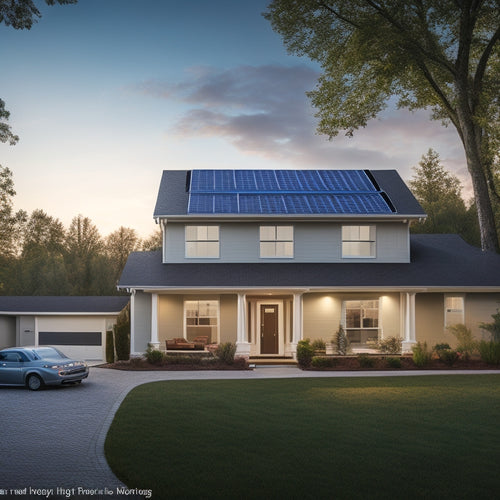
Best Residential Solar Panel Kits for Homeowners
Share
When investing in a residential solar panel kit, you're not only reducing your electricity bills by up to 50%, but also increasing your property value by up to 17%. With the Solar Investment Tax Credit, you can offset the initial investment and enjoy long-term savings. To maximize energy production, look for kits with Maximum Power Point Tracking (MPPT) technology and high-efficiency ratings. Consider your roof's size and constraints to optimize panel placement. By choosing the right kit, you'll not only reduce your carbon footprint but also enhance your home's appeal and resale value. Now, investigate the best options to reveal the full potential of solar power for your home.
At a Glance
- Look for kits with high-efficiency ratings and Maximum Power Point Tracking (MPPT) technology for optimal energy harvesting.
- Consider kits with flexible system designs and adjustable panel angles to address shading factors and roof irregularities.
- Opt for kits with compact designs and space optimization strategies to maximize energy production in limited roof space.
- Choose kits with continuous monitoring and efficient energy harvesting capabilities to reduce maintenance requirements.
- Select kits with modern aesthetics that integrate seamlessly into home design, enhancing curb appeal and property value.
Save 50% on Electricity
You can considerably cut your energy bills by installing a residential solar panel kit, which translates to lower monthly costs.
With solar power, you'll generate free electricity during the day, reducing your reliance on the grid and slashing your utility bills. By switching to solar, you can save up to 50% on your electricity expenses, freeing up more money in your budget for other essential expenses.
Additionally, solar panels can increase your property value by up to 17% investment reduces carbon footprint, making it a worthwhile long-term investment.
Cut Energy Bills
Installing residential solar panel kits can greatly reduce your energy expenditures, with potential savings of up to 50% on your electricity bills.
By utilizing the power of the sun, you'll rely less on the grid and more on your own clean energy source. This means you'll pay less to your utility company, freeing up more of your hard-earned cash for the things that matter most.
As a homeowner, you can take advantage of solar incentives like the Solar Investment Tax Credit (ITC), which allows you to claim a tax credit of up to 26% of the total cost of your solar panel system.
This can considerably offset the upfront cost of installation, making energy independence more accessible than ever.
Lower Monthly Costs
Residential solar panel kits can significantly lower monthly costs by reducing your reliance on the grid. By utilizing the power of the sun, you'll generate free electricity and markedly decrease your energy expenses.
With a solar panel kit, you can save up to 50% on your electricity bill, freeing up more money in your budget for the things that matter most.
To maximize your savings, it's crucial to develop effective savings strategies. Start by monitoring your energy usage and identifying areas where you can cut back.
Then, incorporate budget planning into your daily routine to guarantee you're making the most of your reduced energy costs. Consider allocating your savings towards debt repayment, retirement, or other long-term investments.
Increase Property Value Fast
By installing a residential solar panel kit, you'll not only reduce your electricity bills but also increase your home's resale value.
In fact, studies have shown that solar-powered homes sell for up to 15% more than similar non-solar homes.
Additionally, a sleek and modern solar panel system can instantly enhance your home's curb appeal, making it more attractive to potential buyers.
Boost Home Resale Value
Enhancing your home's resale value can be a top priority for homeowners, and one effective way to achieve this is by investing in residential solar panel kits. By doing so, you'll not only reduce your carbon footprint but also elevate your home's appeal to potential buyers.
According to resale trends, homes with solar panels sell faster and for more money than those without. In fact, a study by the National Renewable Energy Laboratory found that solar panels can increase your home's value by up to $15,000.
Additionally, you can take advantage of solar incentives, such as the federal solar investment tax credit (ITC), which allows you to claim a percentage of the total cost of your solar panel system as a tax credit. This can help offset the initial investment and provide a significant return on investment when you sell your home.
Enhance Curb Appeal Now
One of the most effective ways to increase your property's value quickly is to focus on its curb appeal, as it's the first thing potential buyers will notice.
When it comes to solar panels, you might think they'll detract from your home's appearance, but that's not necessarily true. With modern solar aesthetics, you can integrate solar panels seamlessly into your home's design, enhancing its curb appeal and increasing its value.
In fact, studies have shown that homes with solar panels sell faster and for more money than those without. This is largely due to the perceived value of energy efficiency and environmental sustainability.
By incorporating solar panels into your home's design, you're not only reducing your carbon footprint but also making a smart investment in your property's resale value.
When selecting a solar panel kit, look for one that prioritizes design integration. This means the panels will be sleek, streamlined, and blend in with your roof's structure.
A well-designed solar panel system can even become a selling point, setting your home apart from others on the market and attracting buyers who value sustainability and energy independence.
Maximum Power Point Tracking
When you install a residential solar panel kit, you want to guarantee maximum energy harvesting.
Maximum Power Point Tracking (MPPT) technology helps you achieve this by continuously monitoring and adjusting the system's performance to optimize energy output.
With the integration of high-capacity home battery options high-capacity home batteries and advanced energy management capabilities, you can maximize your energy independence and savings.
Efficient Energy Harvesting
By incorporating maximum power point tracking (MPPT) into your residential solar panel kit, you can enhance energy harvesting and maximize the return on your investment.
MPPT is a vital component of solar panel technology that guarantees efficient energy conversion. It works by continuously monitoring the voltage and current output of your solar panels, identifying the best operating point, and adjusting the system's performance to maximize energy production.
With MPPT, you can harvest more energy from the same amount of sunlight, even in varying weather conditions. This is particularly useful during periods of partial shading or changing temperatures, when energy output might be compromised.
Improved System Performance
Your residential solar panel kit's system performance is greatly enhanced with maximum power point tracking (MPPT), as it optimizes energy production by identifying and adapting to the ideal operating conditions.
This technology guarantees you get the most out of your solar panels, even on cloudy or partially shaded days. With MPPT, your system can operate at its maximum potential, resulting in increased energy output and reduced energy losses.
MPPT also improves system reliability by reducing the risk of overheating and electrical stress on your solar panels. This means you can enjoy a longer system lifespan and fewer maintenance requirements.
Additionally, MPPT enables easy installation, as it allows for flexible system design and configuration. You can install your solar panels in a way that suits your roof's design and your energy needs, without worrying about complex wiring or electrical connections.
Consider Roof Size Constraints
When evaluating your roof's potential for a residential solar panel kit, you'll need to accurately measure its size to determine how many panels can fit.
This measurement is essential, as it directly impacts the system's overall energy output and cost.
Roof Measurement Importance
Measuring your roof accurately is crucial in determining the best residential solar panel kit for your home. You need to evaluate various factors, including roof size, angles, and shading factors, to guarantee you get the right fit.
| Roof Measurement Factors | Importance |
|---|---|
| Roof Size | Determines the number of solar panels you can fit and the overall energy output |
| Roof Angles | Affects the solar panels' energy output, with ideal angles varying by location |
| Shading Factors | Includes obstacles like trees, chimneys, or nearby buildings that can reduce energy output |
Accurate measurements will help you choose a solar panel kit that maximizes energy production and fits your budget. Don't assume your roof is a perfect rectangle; take precise measurements to account for any irregularities. Think about enlisting the help of a professional if you're unsure about the process. By taking the time to measure your roof correctly, you'll be well on your way to utilizing the power of solar energy and enjoying the freedom that comes with it.
Space Optimization Strategies
With roof size constraints in mind, maximizing space becomes essential to harness the maximum energy potential from your residential solar panel kit.
You'll want to strategically position your solar panels to increase energy production while accommodating your roof's unique dimensions. Compact system design and vertical installation are effective strategies to overcome space limitations. A thorough roof orientation analysis will help identify the most suitable placement for your solar panels, guaranteeing peak energy harvesting.
To guarantee a seamless integration, consider aesthetic integration and multi-functional spaces. For instance, you can incorporate solar panels into your roof's design or use them as a canopy for outdoor living areas.
Shading solutions, such as adjustable panel angles, can also mitigate the impact of surrounding structures or trees. Modular systems allow for flexibility in design and can be customized to fit your roof's unique shape and size.
Urban installation and dual-use structures, like solar-powered carports or greenhouses, can further maximize space efficiency. By implementing these space optimization strategies, you can unlock the full potential of your residential solar panel kit and enjoy the freedom that comes with renewable energy.
Higher Efficiency Rating Guaranteed
With a higher efficiency rating guaranteed, you can rest assured that your residential solar panel kit is designed to maximize energy harvesting.
This means you'll be able to generate more power from the same amount of sunlight, resulting in lower electricity bills and a smaller carbon footprint.
Maximum Energy Harvesting
Utilizing the full potential of solar energy relies on optimizing your residential solar panel kit's performance, and that's where maximum energy collection comes into play.
You want to ascertain that your solar panel technology is converting sunlight into usable energy at the highest rate possible. This is achieved through advanced energy conversion systems that minimize energy loss and maximize output.
When it comes to maximum energy harvesting, you'll want to look for solar panel kits with high-efficiency ratings.
These kits are designed to capture more sunlight and convert it into usable energy, resulting in greater savings on your electricity bill.
Additionally, look for kits with built-in maximum power point tracking (MPPT) technology, which optimizes energy conversion and minimizes energy loss.
Frequently Asked Questions
Can I Install Solar Panels on a Metal or Tile Roof?
You can install solar panels on a metal or tile roof, but you'll need to reflect on specific requirements for metal roof installation, such as waterproofing and structural integrity, and tile roof considerations, like weight distribution and potential tile damage.
Do Solar Panels Work During Power Outages?
Like a captain steering through stormy weather, you're seeking autonomy during power outages. You'll find solace in knowing that solar panels can work during outages, but only if you have a solar battery, granting you grid independence and uninterrupted power.
Are Solar Panels Resistant to Hail and Extreme Weather?
You'll be relieved to know that solar panels are designed to withstand harsh conditions, boasting impressive hail resistance and the ability to perform under extreme weather, ensuring your energy independence remains uninterrupted even in turbulent times.
Can I Expand My Solar Panel System in the Future?
Did you know 85% of homeowners upgrade their solar panel systems within 5 years? You can easily expand your system in the future by ensuring system compatibility and planning for future upgrades, giving you the freedom to adapt to changing energy needs.
Do Solar Panels Require Regular Maintenance or Cleaning?
You'll find that solar panels require minimal maintenance, but occasional cleaning is necessary to guarantee ideal energy production; typically, cleaning every 6-12 months is sufficient, and it can even enhance solar panel longevity, giving you more energy independence.
Explore More
You've made it! You've survived the overwhelming world of residential solar panel kits. Pat yourself on the back, because you're one step closer to saving 50% on electricity (hello, extra cash for avocado toast). Now, go forth and impress your neighbors with your newfound eco-friendliness. Just remember, with great power comes great responsibility – to maximize your roof space, that is. Happy solar-ing!
Related Posts
-

Solar Phone Chargers for Camping Essentials
Solar phone chargers are must-haves for your camping essentials, allowing you to stay connected while enjoying nature...
-

The Future of Residential Energy Storage
The future of residential energy storage looks promising and cost-effective for you. With lithium-ion battery prices ...
-

Cost of Solar With Battery Backup
You're investing in a solar panel system with battery backup to guarantee reliable power during outages. The cost of ...


